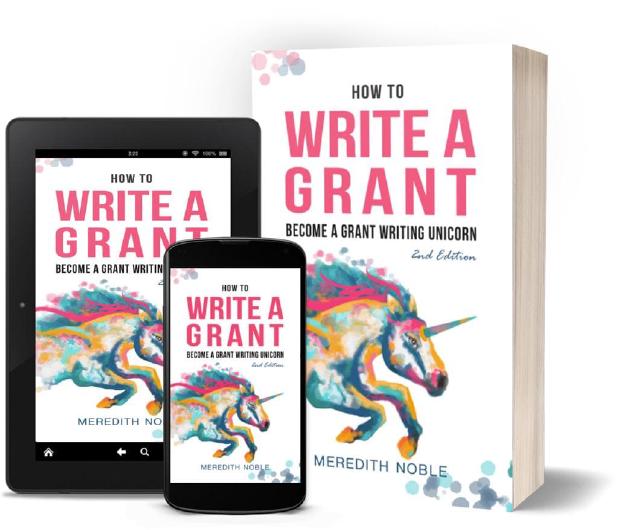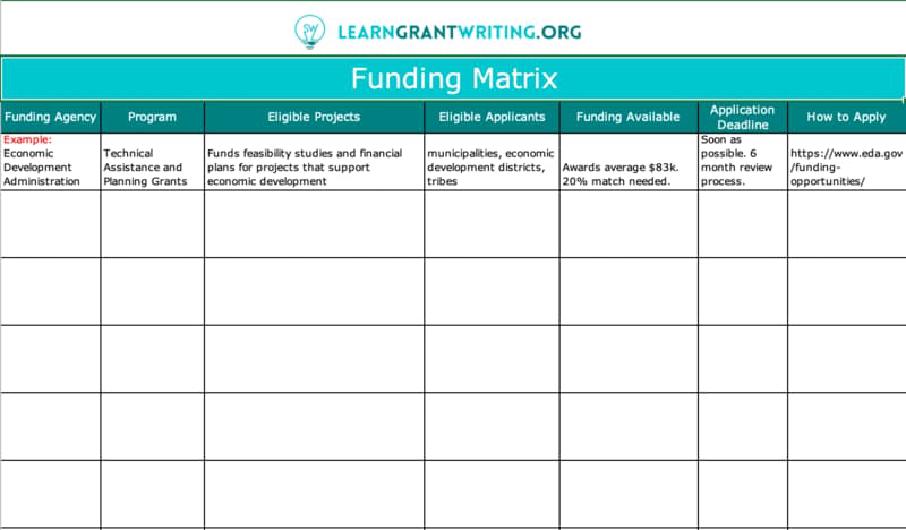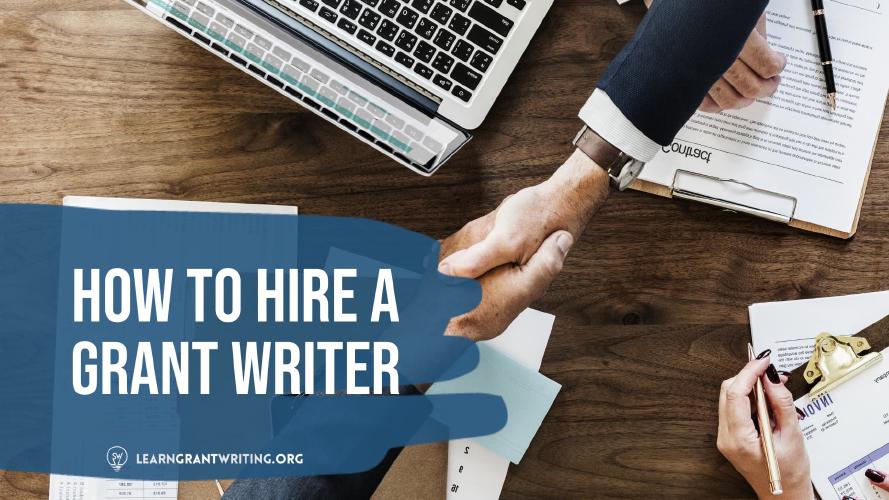Introduction
A question we are often asked is how to hire a grant writer. It seems that hiring a grant writer isn’t quite as straightforward as hiring a cleaner for the office or hiring out the oil change on the company vehicle. This blog post will break down how to hire a grant writer into tiny, bite-sized steps—hopefully answering your biggest questions about the process. We want you to leave informed and confident in your pursuit of hiring a grant writer.
How do you pay grant writers?
This is a biggie so we’re going to dive right into the money talk ;). We get asked this question a lot and we know many newer nonprofits are wondering about it too.
Can you pay a grant writer from the grant?
Short answer: No. We will dive into how you then pay a grant writer, but first let's unpack your question. Many organizations are especially curious about how to pay grant writers because years ago, it was common practice to charge grant writing services based on the success of the grant or include it as a percentage of the grant funding request.
However, we know those types of pricing are not ethical. Professional organizations such as the Association of Fundraising Professionals and the Grant Professionals Association, bar grant writers from taking a percentage of the grant, also known as working on commission. At Learn Grant Writing, we also teach against paying grant writers a commission.
Staff time spent writing grant proposals and other costs relating to applying for or renewing grants, and reporting on grants received are all considered fundraising activities and expenses. According to the National Council of Nonprofits, “the Association of Fundraising Professionals "AFP" and the National Council of Nonprofits agree: compensating fundraisers with a commission on contributions is not ethical.”
Moreover, grant writers put in the time and effort developing a final deliverable that reflects your organization’s greatest strengths. Grant writers are hired to produce high quality content not to determine the outcome of the grant application. A grant writer cannot guarantee that the grant they write will be successful. A stellar grant writer will certainly increase your odds of success! But, again, they can't guarantee it. They need paid for the time and professional skill they bring to your organization.
It’s also important to remember that funders are not interested in funding an organization’s fundraising activities which grant writing falls under. Therefore, grantmakers won’t allow you to add a grant writer’s commission as part of your grant budget.
Acceptable pricing structures that are most common include an hourly rate for the time spent on the grant application and a flat project fee. Once the scope of work is determined, a fixed fee can then be determined. Any adjustments to the scope of work can be amended in the contract. A fixed fee helps to keep everything transparent. A lot of times, nonprofit staff need to consult the Board to get approval for large payments so this can help expedite that process and no one is surprised at the end of the project.
Then, how do you pay a grant writer?
The payment schedule depends on the grant writer. Common payment methods include:
- Payment by the hour, or
- 50% up front, 50% upon completion, or
- Invoices sent monthly for percent of work complete, or
- Invoice upon project completion.
Sometimes organizations are interested in paying a grant writer a certain amount of money upfront, then the rest of the money when the grant is submitted. Grants are never guaranteed; even though a grant writer might create the most carefully crafted proposal a client still may not be awarded due to funder priorities, preference, other applicants, etc.
Simply put, it is fair for grant writers to be paid for their work and expertise regardless of the outcome (although they should be of course putting forth their best effort to win the grant).
How much does it cost to hire a grant writer?
What can organizations expect to pay a grant writer? The first point to keep in mind is what grant writing entails
and the high value a grant writer can bring to your funding pursuits.
Grant writers do a lot more than just writing. Depending on the project, they also provide the following:
Project management/communication with funders, organization contacts, third-party researchers.
Budget development.
Grant funding research.
Programmatic design.
Additional consultation as needed.
In short, grant writers offer a lot of expertise. The cost of a grant writer varies from writer to writer. In our Grant Writing Collective, we use this handy chart to highlight appropriate ball park costs associated with grant writing.
BALL PARK FEES
| Affordable/Fair | Premium | |
|---|---|---|
| Funding Strategy | $900-$2,500 | $2,500-$8,000 |
| Grant Applications | ||
| LOI/Straightforward | $300-$1,200 | $1,500-$3,000 |
| Moderate Difficult | $1,200-$3,500 | $3,500-$6,500 |
| Federal Grant | $3,500-$5,500 | $7,000-$25,000+ |
| Hourly | $50-$75/hr | $100-$150/hr |
Where do you find grant writers?
As mentioned previously, it can be a bit bewildering to hire a grant writer. Finding a grant writer is one particularly challenging aspect of the process. A few places you might begin looking for grant writers are:
Learn Grant Writing
We’re all about helping folks make a positive impact in their community. We can connect you with a talented and certified grant writer in our pool of grant writers. Review the process and look for a grant writer that fits your goals. All of the grant writers in our pool have received a certification of completing our proven grant writing training program. Once you select a grant writer to work with, we let the two of you work out a contract and cheer you on as you win grants! This is but a small sample of all our grant writers, so if you don't find someone that is a fit (and you have budget to pay them), email us at info@senworks.org.
Upwork
Upwork is a popular place to find freelancers for a variety of services including graphic design, editing, and
even grant writing. Once you post a job (for free!), Upwork connects you with talent around the world, or near
you. You’re able to compare bids, reviews, and prior work before interviewing and hiring the best fit.
It’s worth noting that most high quality grant writers are not advertising their services on Upwork, so it is
likely that you’re going to need to look elsewhere.
Grant Writer Team
GrantWriterTeam is a service for matching grant seekers with grant writers. There is a $50 administrative fee to
begin the process. You can
submit your request for a grant writer and you’re
on your way.
Once your application is uploaded, grant writers will ‘bid’ on your job request and the quotes will be sent to you
through the portal via email. You are able to view the grant writer’s expertise and accept the writer of your
choice. Together, you and the grant writer are able to negotiate the contract with a list of deliverables. As each
deliverable is completed, the files are uploaded to the GrantWriterTeam portal by the writer, and payment is made.
Once the payment is made, you will be able to download and review the deliverable.
Word of mouth
Is there anything more reliable than talking with individuals whose opinions you trust and respect? Check in with your board members, staff members, and fellow nonprofit professionals in your area. Or, is there a Facebook or LinkedIn group you can ask for grant writer recommendations?
I’m interested in a grant writer...now what?
Yay! After you’ve identified a grant writer you’re interested in working with, reach out! Send them an email with a brief description of the type of project you’d like assistance with and request a meeting. Or, you can also request more information about their work experience first and ask them to send over writing samples or a resume.
Regardless, the initial meeting should serve as a good “get-to-know-you” for both parties. You are welcome to ask more questions about the grant writer’s experience and grant writing process. You will share more details about the project you’re working on or hoping to get funded. At the end of that meeting, you can request a proposal from the grant writer outlining cost, schedule, scope of work for the discussed project if that project is in a place to move forward.
If all goes well, the proposal (aka: contract) will be finalized between you and the grant writer. Names are signed on the dotted line and you’re on your way to pursuing grant funding!
Grant Writing Unicorn Book
#1 bestseller on Amazon for nonprofit fundraising and grants. Do you have a copy of, “How to Write a Grant: Become a Grant Writing Unicorn”?
Get a Copy Now
How do I know if they are a good grant writer?
This can be tricky since there aren’t necessarily hard and fast rules to quantify being a good grant writer. However, there are a few things you can look at.
First, are they professionally trained or certified? A certification isn’t a requirement to write grants and there are many great grant writers out there who aren’t certified. However, a certification or involvement in professional grant writing groups is a huge benefit for grant writers and, in turn, their clients. With a solid professional network and training, grant writers have access to resources they wouldn’t otherwise have on their own.
Second, you can look at their success stories and industry experience. While having won millions of dollars in grant funding is nice, it’s not always the best measure of success simply because grants are so unpredictable. For instance, even though the work might be high quality, a grant application could be denied because the funder had different priorities in mind based upon the applications submitted. That is just one reason a grantmaker may decline to fund grants. Most of these reasons (competing organizations, funder priorities, funder/applicant relationship, etc.) are all outside of a grant writer’s control.
Furthermore, there are hundreds of grant programs and foundations. A lot of times grant writers develop a niche for a particular program. With that in mind, you might consider looking for a grant writer with a proven record of winning grants in and/or high working knowledge of a particular program.
Third, word of mouth again. Have other professionals you know worked with this individual? What feedback do they have? Would they recommend this grant writer?
Finally, trust your gut. We know we’re echoing our moms here, but we’re serious: trust your gut. Rarely will it steer you in the wrong direction. You are also always welcome to ask a grant writer for references and/or samples of their work.
How can we prepare to work with a grant writer?
Reading this blog post has put you right on track to start preparing to work with a grant writer. Nice work! First understanding the expertise grant writers can and cannot offer to your organization is key.
There are a few other things to consider getting grant ready as well such as:
- Does the Board of Directors need to approve a contract with a grant writer? What can you do to start that process?
- How do you want to communicate with the grant writer?
- Who will be the primary contact for your organization? (Yes, there really is such a thing as having too many cooks in the kitchen! Try to keep it limited to one main person. Everyone will be happier for it—trust us.)
- Think through what programs or projects you would like to fund—do they align with your organization’s strategic plan?
- What administrative leg work can you complete prior to hiring a grant writer? This might look like gathering important information and documents most grants will require including Tax Exempt Status Letter, IRS Form 990, W-9, strategic plan, organizational chart, Board of Directors, audited financial statements, Annual Report, program/project details (scope of work description, outcome measures, target population, relevant statistics, etc.), and history of grants received.
Becoming grant ready is important to successful grant pursuits. Grant readiness is the concept of being prepared
financially and organizationally at the program, project, and organization levels. In other words, the back end of
your organization should be in order before applying for funding. A grant writer will still work through
application-specific details with you, but the process will run smoother if you come to the table prepared.
Ensuring you have thought through all of the above information is a great place to start getting grant ready. It is
all about getting super organized so you can find and relay the information you need to write grants efficiently and
effectively. And, after your initial meeting with a grant writer, together you’ll be able to create a customized
plan that will work for your organization’s specific needs.
Free Grant Matrix Template
To stay organized, we recommend you put your grant findings in a matrix. This way you can systematically filter the top pursuits.
Get Free Grant Matrix Template
Final Takeaway
Overall, while it can be daunting to begin the process of hiring a grant writer, we hope this blog post simplifies the task for you. Let us know if you have any further questions about how to pay grant writers, where to find grant writers, how to initiate the next step in working with a grant writer, identifying a grant writers’ strengths, or how to prepare to work with a grant writer. We’re here to help!
👉 For more tips and tricks on grant funding and writing a proposal, be sure to check out our FREE Grant Writing Class! You can also DM us on Instagram if you have any questions.







